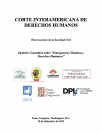The Due Process of Law Foundation (DPLF), the Coordinadora de Desarrollo y Defensa de los Pueblos Indígenas de la región San Martín (CODEPISAM), the Federación de Pueblos Indígenas Kechwa Chazuta Amazonía (FEPIKECHA), the Federación de Pueblos Indígenas Kechwas del Bajo Huallaga San Martín(FEPIKBHSAM), the Instituto de Defensa Legal (IDL), and the Forest Peoples Programme (FPP), submitted a brief to the Inter-American Court of Human Rights regarding the advisory opinion on "Climate Emergency and Human Rights", which seeks to clarify states’ obligations in the face of the climate emergency.
The brief focuses on the necessary harmonization between multilateral commitments to combat global warming and the internationally recognized rights of Indigenous and tribal peoples. It suggests that the Court establish binding obligations of respect, guarantee and prevention in relation to carbon credit trading and environmental conservation projects in Indigenous territories.
The brief is based on international human rights standards, comparative law and the experience of Indigenous communities and organizations whose ancestral territories are overlapped by the Cordillera Azul National Park and the Cordillera Escalera Regional Conservation Area in the San Martin region of the Peruvian Amazon. Carbon credit trading in this region has been carried out without consent and in violation of a series of fundamental rights of the Kichwa peoples and communities, in addition to non-compliance with transparency and access to information obligations in the management of environmental issues. These abuses are representative of the reality faced by various Indigenous peoples in the continent.
Advisory opinions are a binding interpretation of the American Convention and other treaties so that states can adapt their laws, practices, and public policies. The opinion on climate emergency and human rights will be adopted by the Inter-American Court in the coming months, after public hearings in which the organizations that submitted written briefs are entitled to make an oral intervention.
See the brief here (available in Spanish only).






